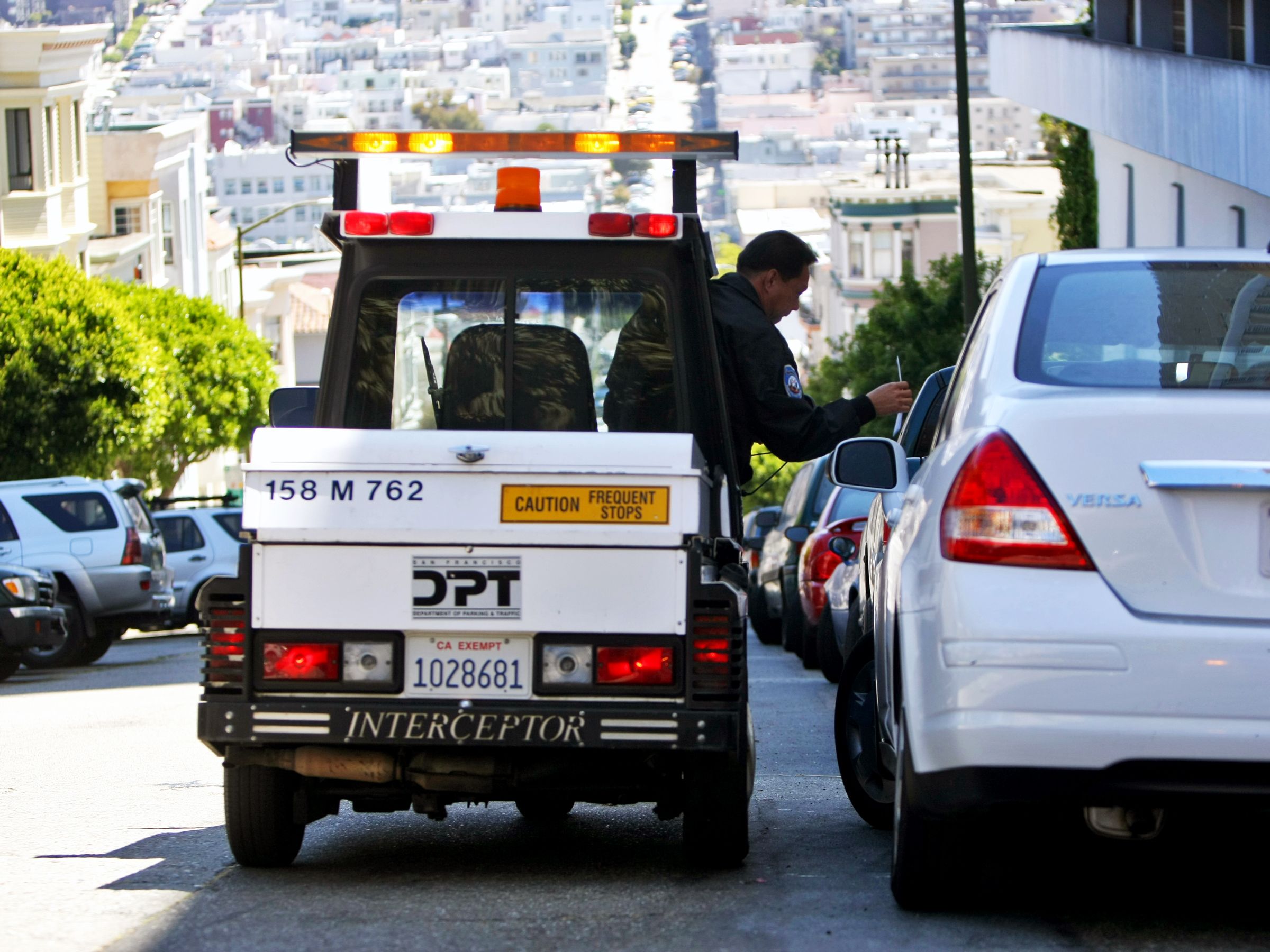Car owners in San Francisco fed up with parking tickets had a brief moment of respite on Tuesday thanks to a website called Find My Parking Cops. The site kept tabs on where city workers were issuing tickets, showing the locations of parking control officers on a city map in real time.
I’m using the past tense to tell you about it because shortly after the site went live, the real-time data feed powering it went dark.
Before that sad turn of events, and while the buzz around the site was still high, I spoke to the creator, Riley Walz, about how he put it together. Walz is a software engineer known for building stunty websites. He got the idea for this one after looking at all of the information listed on the parking tickets issued by the San Francisco Municipal Transportation Agency. Each ticket shows the make of the car, the license number, and so on. But right at the top is the ticket’s citation number.
“I figured out that the ticket numbers are predictable,” Walz says, “which means I can efficiently scrape them.”
Walz’s website looked quite similar to Apple’s Find My feature, a tool sometimes used by iOS owners to track the location of family and friends. But rather than people you know IRL, this site showed the trail of tickets issued by parking enforcers as they zipped around San Francisco in their tiny single-seaters.
The website quickly went viral on social media Tuesday, the same day as its initial release. It enjoyed a few good hours, before the site’s functionality vanished: City officials appear to have cut off the sources of data that Walz was using to track parking enforcement.
“In rare lightning speed, the SF government changed their site within hours of this site going live,” reads an announcement Walz added to Find My Parking Cops on Tuesday afternoon. “I can’t get data from it anymore.”
“Citations are a tool to ensure compliance with parking laws, which help keep our streets safe and use our limited curb space efficiently and fairly,” an SFMTA representative said in an emailed statement on Tuesday afternoon, after Walz’s site was no longer functional. “We welcome creative uses of technology to encourage legal parking, but we also want to make sure that our employees are able to do their jobs safely, and without disruption.”
Ticket Master
The idea for Find My Parking Cops was first sparked when Walz’s roommate got a parking fine. Walz noticed the nine-digit identification number on the ticket and started looking for patterns. By using publicly available information, he believed he cracked the code.
“It seems each possible ticket number follows a pattern: add 11, except add 4 if the last digit is 6. So, no ticket can end in 7, 8, or 9,” Walz wrote in a blog post explaining the site. “So, the ticket after 984,946,606 is actually 984,946,610, and after that is 984,946,621.”
He suspected this absurd-seeming pattern was due to limitations baked into the software used by parking control officers. Whatever its reason for existing, the pattern of sequential ticket IDs, paired with parking officers likely claiming batches of ticket numbers, meant Walz was able to track their routes by plotting each parking ticket on a map as soon as it was entered into the system. A car owner could look at the activity of the officers currently out on patrol and see if any of them were slowly descending on their neighborhood.
Last year, parking officials in San Francisco issued over a million tickets within city limits, which amounted to over $100 million in fines for car owners. “I actually don’t have a car, but I have plenty of friends that talk about it,” says Walz. Like most costs in San Francisco, these tickets can quickly add up. For example, forgetting to move your car during the weekly street sweeping—an error my household has made more than once—will cost you $90 every time.
Dude, Where’s My Parking Cop?
The website’s live updates were pulled from the city government’s website and visualized on an Apple Map. Find My Parking Cops tracked the routes of individual parking control officers, giving them each unique visual identifiers, as well as their cadence of tickets.
On Tuesday, for example, the site displayed one officer seemingly starting their shift around 10:30 am and handing out 35 tickets over the next few hours as they patrolled a neighborhood in Lower Pacific Heights. The citations logged were primarily for expired meters, which costs $107 per ticket, and not having a residential permit, which costs $108 per ticket. In total, the fines racked up by that one officer over a few hours amounted to almost $4,000.
Who’s handing out the most tickets each week? Walz included a leaderboard on the website that ranked just how much in fines each officer handed out. While officers were only identified on the map by a number and their initials, their cumulative ticket cost was tracked. When WIRED was last able to check Walz’s website on Tuesday, the top fine giver had issued 157 tickets so far, handing out over $16,000 in fees for violations.
Prior to Find My Parking Cops, Walz created another San Francisco–specific website. This one used a phone, placed on a street corner in the Mission District, to identify what songs people were listening to in public. He then uploaded a live feed of the songs, captured and identified through the Shazam app, onto the Bop Spotter website. It provided a little peek into what neighborhood residents were bumping at the time while also slyly nodding at the abundance of surveillance in the city. He’s also previously built a site, called IMG_0001, to surface old YouTube clips uploaded by everyday people in the platform’s early days. Those grainy, private videos stand in stark contrast to the stuff that dominates the platform today.
The parking ticket tracker was another side project for Walz. “I worked in my free time on the weekends the last few weeks to make it happen,” he says.
While Walz’s websites sometimes come with a dose of social commentary, he didn’t envision this project as making some kind of grand, sweeping statement about parking tickets or what it means to drive in 2025. Rather, it’s another entry in his repertoire of cool websites powered by unique data sources.
“I’m not ‘pro’ parking cop. I’m not ‘anti’ parking cop,” says Walz. “It’s just data I was able to unearth, and I thought it would be cool to visualize it.”
And now it’s gone. Representatives for Apple did not respond to immediate requests for comment. I reached out to Walz after the city’s data feed was cut off, but he didn’t pick up.




